Iran: UK diplomatic break is step into unknown
- Published
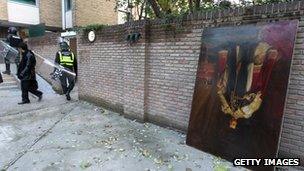
Many in Iran view Britain as a superpower which has repeatedly intervened in its affairs
Britain, encouraged by the outspoken support of countries like China as well as Europe and the United States, has decided to make the toughest response possible to Tuesday's attacks on the British embassy buildings in Tehran.
Most of the countries that have been supportive - including France, Germany, Austria and Turkey - have become increasingly worried about the erratic way that Iran has been behaving, and worried too about its aims and intentions now that it seems close to being able to assemble a nuclear weapon.
Cutting off all diplomatic relations is a step into the unknown, certainly, but diplomatic relations alone will never be enough to keep the peace. Britain, after all, had diplomatic relations with Nazi Germany until the moment war was declared.
So by the weekend, the Iranian embassy in London, just like the British one in Tehran, will essentially be empty, and any diplomatic activity will have to go by other routes.
'Britain's fault'
At the last moment Iran's foreign ministry made desperate attempts to save the situation by putting out a statement apologising for what happened.
But it was far from being enough. And anyway the foreign ministry does not count for much in the political battles going on inside Iran.
There was no apologising in Tehran itself.
The speaker of the Iranian parliament, Ali Ardashir Larijani, said the attack on the embassy was Britain's fault for interfering in Iran's affairs and trying to dominate it over the decades.
Mr Larijani is an educated and experienced politician with a good understanding of the outside world. And although he's playing to a political audience -he may well be hoping to stand at the next presidential election- he speaks for a great many people in Iran.
'Pulling the strings'
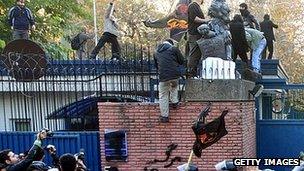
Iran's foreign ministry put out a statement apologising for the attack
Hard though it is for the British to understand, in Iran they are seen as a superpower which has intervened decisively in their affairs time and again over the past two centuries.
In 1906 Britain undermined the move to introduce a democratic constitution.
In 1925 the British encouraged Reza Pahlavi to make himself Shah. Then in 1941 they overthrew him because he was too openly pro-Nazi, and put his son on the throne instead.
As a result, when the revolution came in 1979, the last Shah suspected that Britain was behind it, giving British backing to the ayatollahs. But the ayatollahs, for their part, have always accused Britain of trying to get rid of the Islamic Republic.
For Britain, this is all so much ancient history. It is 60 years since the British regarded themselves as a superpower.
But Iranians have not forgotten, and they are much less aware of the changes in the outside world. Many Iranians still credit Britain with pulling the strings behind the scenes, and believe that the British tell the Americans what to do.
Political enemies
All this feeds back into the political infighting in Tehran.
It seems certain that the extreme conservatives, who nowadays look to the Supreme Leader, Ali Khamenei, were behind the attack on the British embassy.
Their aim was to discredit President Ahmadinejad, who despite his own radicalism can see advantages in keeping up relations with the West.
He is the real loser from Britain's decision to cut off all diplomatic links. But he is a clever politician, with an instinct for knowing how to please the crowds. We can expect him to find some way to hit back at his political enemies.
- Published30 November 2011
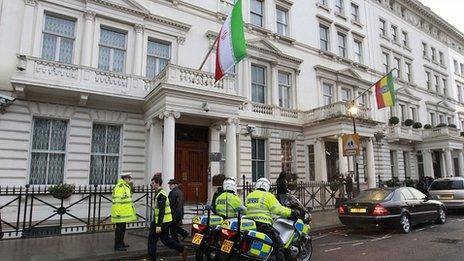
- Published30 November 2011
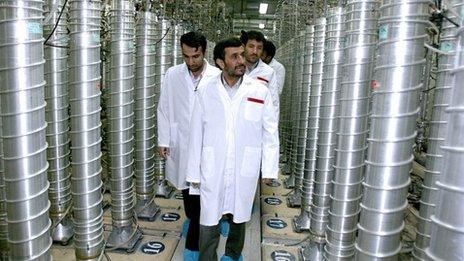
- Published30 November 2011
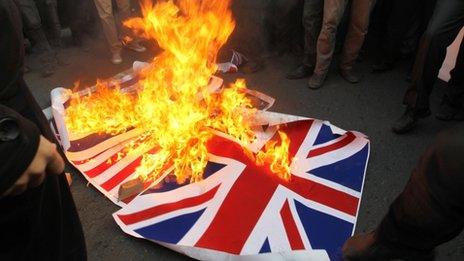
- Published30 November 2011
- Published25 November 2014
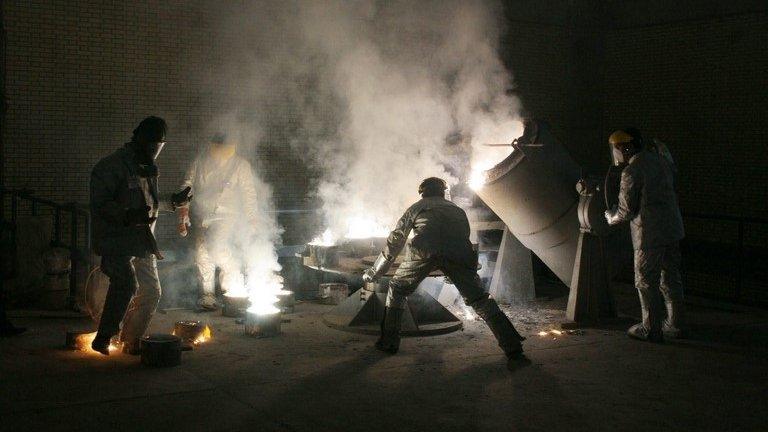
- Published29 November 2011